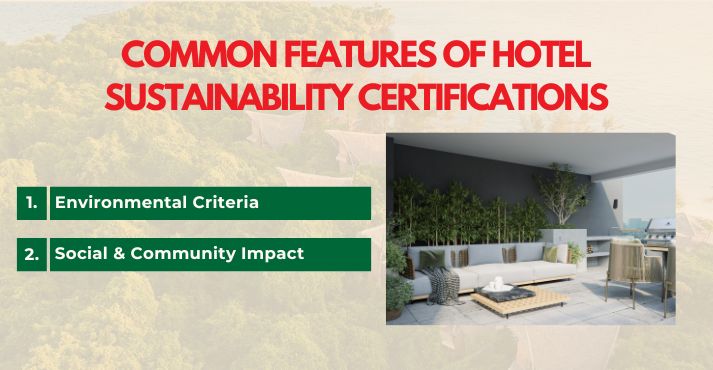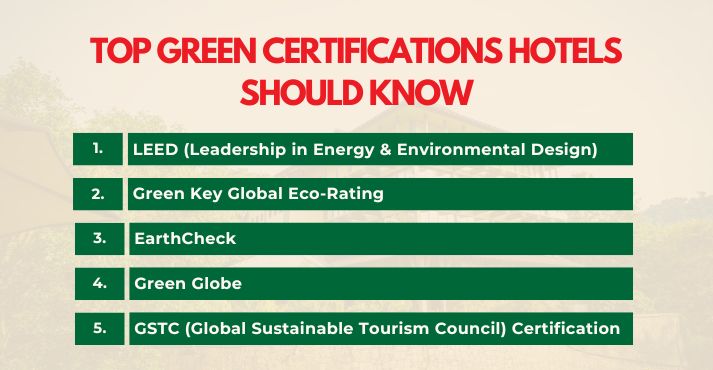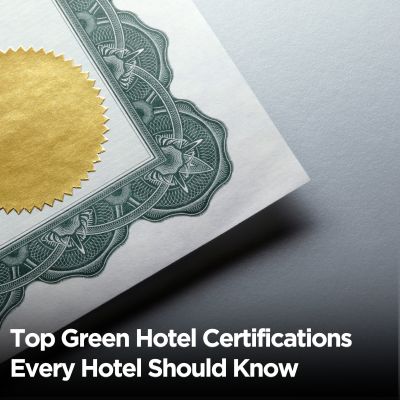Sustainability has become a significant focus in the hospitality industry. Travelers today are more mindful of their environmental impact and want to support businesses that share their values.
Many guests now choose hotels that show a real commitment to eco-friendly practices, not just empty promises.
Green hotel certifications help hotels prove they care about the planet. These certifications do more than add a badge to a website. They show that a hotel is taking action to save energy and water, reduce waste, and protect local communities.
For hoteliers, this means stronger credibility, improved operational efficiency, and the opportunity to attract new types of guests who prioritize sustainability.
This blog will introduce the most important green hotel certifications that every hotel should know. It will also explain why investing in these certifications is a smart move for the future of any hospitality business.
Why Green Certifications Matter in the Hotel Industry
Green certifications help prove that a hotel’s sustainability claims are real. Guests today want more than good service. They look for businesses that take environmental responsibility seriously.
According to a 2023 survey shared by the World Economic Forum, 76% of travelers want to make more sustainable travel choices.
Hotel sustainability certifications give hotels a clear advantage. They provide guidelines for using less energy and water, managing waste, and supporting local communities. These improvements can lower operating costs and increase long-term savings.
By following green building standards for hotels, properties can also enhance indoor air quality and create a healthier environment for both guests and staff.
Beyond financial and environmental benefits, certified hotels often get better visibility online. Major booking platforms, such as Booking.com and Expedia, highlight certified properties, making them easier to find for eco-conscious travelers.
In some countries, government programs even offer tax breaks or priority in tourism listings to hotels with verified green credentials.
Many investors now pay close attention to ESG (Environmental, Social, and Governance) scores. A strong ESG score helps attract investors who value sustainability and social responsibility.
Implementing sustainability through official certifications also strengthens a hotel’s reputation and shows a commitment to long-term environmental goals.
Overall, eco-friendly hotel certifications are not just badges. They help hotels earn trust, improve daily operations, and connect with a growing market of travelers who care about the planet.
Common Features of Hotel Sustainability Certifications

Before examining specific certifications, it is helpful to understand what they usually measure. Most hotel sustainability certifications assess three primary areas: environmental performance, social and community responsibility, and operational efficiency.
These standards make it easier to compare different programs and help hotels focus on what matters most.
1. Environmental Criteria
Environmental impact is a major focus in any eco certification for hotels. Hotels are reviewed on how they use energy, manage water, and handle waste. This may include using renewable energy, installing water-saving fixtures, and monitoring carbon emissions.
According to the UN World Tourism Organization, hotels can reduce their energy use by up to 20% through simple efficiency measures. By implementing these changes, hotels can simultaneously reduce costs and lower emissions.
Waste reduction is also important. Cutting down on single-use plastics and starting composting programs help hotels move toward greener operations. As more guests choose eco hotels, strong environmental actions show real effort and help earn their trust.
2. Social & Community Impact
Many certifications include social responsibility as a key element. This covers fair labour practices, ethical treatment of employees, and creating safe, inclusive workplaces.
Hotels are also encouraged to support local economies by sourcing food and supplies from nearby producers.
Community outreach programs, such as partnerships with local schools or environmental groups, help build strong connections with surrounding neighborhoods.
In 2025, Booking.com’s research revealed that 73% of travelers want their spending to benefit the local community, and 69% aim to leave places in better condition than they found them.
These efforts show a genuine commitment to long-term social impact and help position official hotels as responsible members of their communities.
Top Green Certifications Hotels Should Know

Choosing the right certification can feel overwhelming for hotel owners. Each program has different focus areas and processes. Knowing what sets these certifications apart helps hotels find the best fit for their goals.
Below are some of the most respected options worldwide:
1. LEED (Leadership in Energy and Environmental Design)
LEED began in the United States and is now recognized worldwide. It rates buildings based on sustainability in design, construction, and operations. There are four levels: Certified, Silver, Gold, and Platinum.
To qualify, hotels focus on efficient building materials, energy systems such as solar or smart lighting, and strategic location choices that minimize travel impact. Indoor air quality and water-saving technologies are also important parts of the evaluation.
Examples of LEED-certified hotel brands include Marriott’s Element hotels and the Proximity Hotel in North Carolina, which has achieved LEED Platinum certification.
Hotels that follow LEED standards can reduce energy use by up to 25% and water use by up to 11%, resulting in long-term cost savings. These efforts help build guest trust and support a brand’s reputation as certified green hotels, focusing on the future of the hospitality industry.
2. Green Key Global Eco-Rating
Green Key Global started in Canada but is now used internationally. It offers a 5-level rating system that helps hotels improve year by year. Properties are reviewed through a detailed third-party audit and must submit to regular evaluations.
The program examines energy and water conservation, waste reduction, and corporate social responsibility. Hotels are also evaluated on their community programs and sustainable purchasing practices.
For example, Fairmont Hotels & Resorts properties in Canada and the United States hold Green Key certifications. These certifications enable guests to quickly identify properties that are committed to sustainability.
3. EarthCheck
EarthCheck is widely recognized across the Asia-Pacific region and in many luxury hotel markets. It focuses on climate action, local sourcing, and risk management. Hotels undergo a benchmarking process, followed by annual audits.
EarthCheck also checks how hotels support local communities and protect biodiversity. The Marina Bay Sands in Singapore and Soneva Resorts in the Maldives are examples of EarthCheck-certified properties.
Hotels using EarthCheck standards show leadership in the move toward intelligent hotels that can adapt and reduce environmental impact over time.
4. Green Globe
Green Globe has a strong international presence and uses over 380 sustainability indicators. These cover everything from cultural heritage and local employment to biodiversity conservation.
It aligns with ISO standards, which means it adheres to strict, globally recognized guidelines. Unlike some labels, Green Globe is specific to travel and tourism, making it highly relevant to hotels.
Certified members include Meliá Hotels International and the Mövenpick Hotel Amsterdam City Centre. Green Globe supports hotels that aim to become certified as green hotels, while also preserving local culture and natural resources.
5. GSTC (Global Sustainable Tourism Council) Certification
The GSTC does not directly certify hotels, but it sets global standards that other certification bodies follow. Approved organizations such as EarthCheck and Control Union use GSTC criteria to evaluate properties.
This system helps create consistency and credibility across different regions. GSTC standards include environmental practices, social responsibility, and cultural respect.
A few approved certification partners are Vireo Srl, Control Union, and Bureau Veritas. Hotels working with GSTC-recognized certifiers gain strong global credibility and show they are committed to the future of hotels and responsible tourism.
Regional Certifications Worth Considering

In addition to global programs, many hotels opt for local or regional certifications that align with specific market needs.
These certifications help properties align with local tourism strategies, get listed on regional booking platforms, and even qualify for tax incentives or government support. While smaller in scope, these options carry strong credibility and can become part of a hotel’s USP.
1. Singapore Green Hotel Award
The Singapore Green Hotel Award is supported by the Singapore Hotel Association and the National Environment Agency.
This award encourages hotels to reduce waste, use energy and water more efficiently, and engage guests in green practices. Recognized hotels include the Carlton Hotel and Marina Bay Sands.
This award fits well in the hotel industry, where government partnerships can strengthen community trust and help promote Singapore as a leading sustainable destination. Hotels that achieve this standard also often receive better visibility on local tourism platforms.
2. EU Ecolabel
The EU Ecolabel is one of the most respected eco-labels for hotels in Europe. It adheres to strict criteria for energy use, water consumption, chemical use, and waste management. According to a report, 799 tourist accommodations have received the EU Ecolabel.
For European hotels, this label signals high environmental standards and helps attract guests who value sustainability. It supports environmental certifications for the hospitality industry and can help improve relationships with environmentally focused travel agencies.
3. Nordic Swan Ecolabel
The Nordic Swan Ecolabel is widely recognized and used across the Scandinavian countries. It focuses on energy efficiency, water conservation, food sourcing, and minimizing the use of harmful chemicals.
Till now, Scandic Hotels leads the way with 256 hotels certified under this ecolabel in the Nordic region.
Hotels that carry this label show a strong commitment to local environmental goals and meet high expectations from eco-conscious Nordic travelers. Including this certification helps a hotel stand out and appeals to guests looking for authentic, regionally focused stays.
4. BREEAM
BREEAM (Building Research Establishment Environmental Assessment Method) is based in the United Kingdom and evaluates buildings for sustainability performance.
It measures energy use, pollution, transport, materials, and land use. While it started in the UK, it has now been applied in over 80 countries.
Hotels with BREEAM certification show strong design and operational standards. This fits well with properties that focus on low-carbon strategies and forward-thinking design.
It also supports long-term value for owners looking to improve their environmental certifications for hospitality.
Including regional certifications can help hotels connect with their local market and appeal to both domestic and international guests. These labels show dedication to regional goals and support a hotel’s reputation as a responsible choice in the hotel industry.
How to Choose the Right Certification for Your Hotel
Choosing the best certification can feel like a big decision, but breaking it down into steps makes it easier. Here are some points to consider:
- Budget and timeline: Some certifications require larger investments and longer timelines because they involve upgrades, audits, and ongoing improvements.
- Type of property: A boutique hotel might focus on local eco labels and stronger guest engagement. Large chains may choose global certifications that align with their brand standards.
- Guest expectations: Luxury and wellness travelers often seek strong environmental practices, while business guests tend to focus on efficiency and comfort. A good match can improve the overall guest experience.
- Local vs. international visibility: Consider whether you want to appeal more to local markets or attract international guests seeking certified green hotels.
- Operational strengths and gaps: Evaluate what your hotel already does well and where it needs improvement. This helps pick a certification that builds on existing efforts without overloading the team.
Steps to Get Certified
Once you decide on a certification, following a clear plan makes the process more manageable. Here’s a step-by-step guide:
- Do an internal sustainability audit: Check your current energy, water, waste, and community practices.
- Choose the best-fit certification: Match it to your budget, property type, and guest expectations.
- Work with consultants or auditors: They can guide you on upgrades and prepare your hotel for inspection.
- Train staff and implement systems: Employees are essential for improving practices and supporting guest engagement.
- Submit application and pass assessment: Provide all required documents and complete on-site checks.
- Maintain ongoing reporting for recertification: Keep up regular monitoring to ensure standards are met over time.
Getting certified is a journey. Hotels don’t need to be perfect to begin. Small steps lead to bigger changes, and guests notice the effort to enhance their experience and improve environmental performance.
Promoting Your Green Certification
Once your hotel earns a green certification, it’s important to share the news clearly and authentically. Sharing your efforts with guests can build trust and attract more eco-conscious travelers.
A strong hotel marketing plan can highlight your new achievement and make it part of your brand story.
Start by adding certification badges to your website and online travel agency (OTA) listings. Many guests look for these symbols when choosing a place to stay, and visible badges make it easy for them to see your commitment at a glance.
Train front-line staff to talk confidently about your green initiatives. They can answer guest questions and share details that make visitors feel more connected to the property.
Personal interactions are a crucial part of guest engagement and can significantly enhance the overall guest experience.
Feature your certification in email campaigns and social media content. Photos, behind-the-scenes stories, and simple facts about your eco practices help guests understand the effort behind the scenes.
Sharing this information through newsletters and posts supports current hotel marketing trends that focus on transparency and storytelling.
Mention your certification in press releases or during local sustainability events. Partnerships with local organizations or tourism boards can also help spread the word and position your hotel as a responsible choice.
Adding these steps in your marketing plan builds your brand image and shows guests that you care about more than just offering a place to sleep. It turns your green certification into a real point of pride and a meaningful part of your story.
Conclusion
Certifications turn a hotel’s promise of sustainability into something real and trusted. They help show guests, partners, and staff that the hotel is serious about protecting the environment and supporting local communities.
These programs are more than just a badge on a website; they guide hotels in improving operations, conserving resources, and enhancing the guest experience.
Choosing to get certified is a smart business move that can open new markets and build stronger connections with travelers. Rather than waiting, hotel owners can start exploring options now.
A good first step is to pick one certification to research and begin working toward it this quarter. It can lead to lasting improvements and long-term success.













